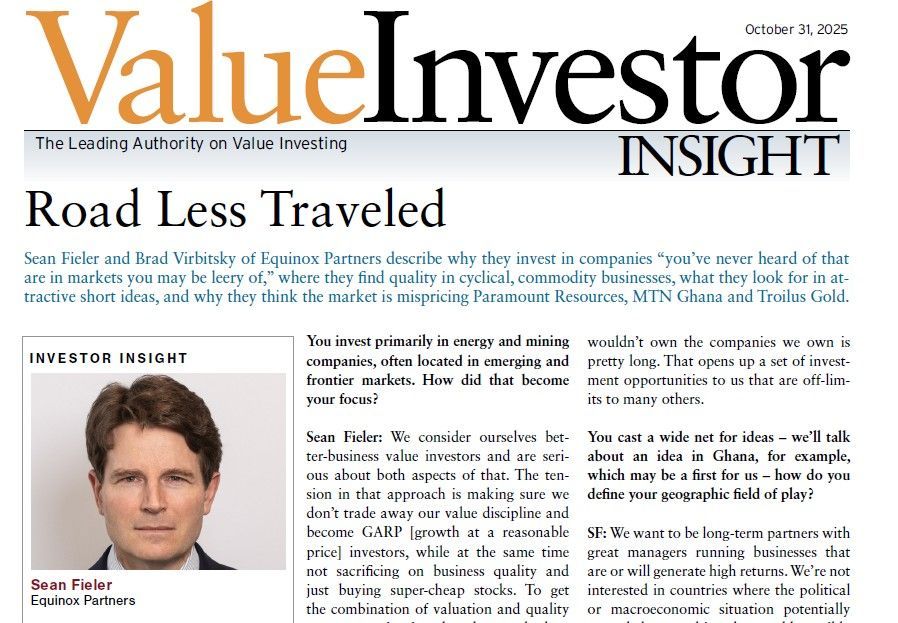Kuroto Fund, L.P. - Q3 2010 Letter
Dear Partners and Friends,
PERFORMANCE & PORTFOLIO
Kuroto Fund, L.P. appreciated 18.3% in the quarter ended September 30,
2010. As of November 30, 2010, our fund was up 45.0% for the year-to-date. This compares to the MSCI Asia Pacific index which was up 9.5% for the year-to-date through November.
Kuroto’s performance this year has benefited from our ownership of businesses in Asian countries that have been either out of favor or under the radar. As the Wall Street Journal pointed out recently, for the first three quarters:
[The] economic growth and political stability in this historically volatile region has set markets like Indonesia, the Philippines and Thailand on fire. Those three markets are up 38%, 34% and 33% [49%, 47%, and 52% in USD including dividends] respectively, on the year—with Indonesia and the Philippines at all-time highs and with Thailand at a 14 year high. —Jonathan Cheng, October 1, 2010, page C8
Asian Monetary Mercantilism
The divergence of emerging economies from those of the developed world has reached extremes rarely seen in recent history. As the US, Europe and Japan fret about intransigent unemployment, insufficient inflation and the possibility of a “double dip,” Asian and other emerging markets are booming. While undoubtedly welcome in Asia, we believe the decoupling of economic performance is likely to create a monetary/currency watershed event for Asian central banks.
To quote CLSA strategist Russell Napier regarding the previous behavior of Asian monetary authorities: “undervaluing the exchange rate has been part and parcel of a policy of locking in competitiveness and attempting to produce full employment.”[1] By fixing their foreign exchange rates to the dollar at the depressed levels following the Asian financial crisis of late last century, the central bankers have provided their exporters with a favorable tailwind (while penalizing importers such as consumers). To achieve this, Asian monetary authorities have intervened in the currency markets to support the dollar vis-a-vis their own money. They have also aligned their domestic monetary policy with that of the US to avoid attracting liquidity with an incrementally tighter policy. But, the artificial support of the dollar and such copycat Asian domestic monetary policies are now completely inappropriate for these economies.
For example, in recent years the US Federal Reserve has pursued extremely loose monetary measures to bail-out bankrupt financial companies and stimulate lackluster demand. The Fed has lowered interest rates to virtually zero and radically expanded the monetary base. Asian authorities also loosened policy in response to the global downturn and to avoid further appreciation of their currency. Such loose policies are now substantially out of sync with booming Asian economies. Exacerbating the situation is Ben Bernanke’s new round of quantitative easing. At the IMF meeting in Washington in September, the Chinese complained that extremely lax monetary policy in America was creating a large and disruptive capital inflow into Asia—a region that does not have the economic difficulties that plague the over indebted US.
For a decade, Kuroto has patiently awaited the end of Asia’s “monetary mercantilism,”—the management of exchange rates to support the dollar so as to foster local export competitiveness and stockpile foreign reserves. This purchase of dollars has artificially depressed Asian currencies (as investors in local currencies we stand to benefit from their appreciation) and resulted in a large accumulation of dollar reserves there. The issuance of local money with which to buy dollars has been and will be inflationary. Very easy local monetary conditions like those in the US now applied to growing Asian economies will be inflationary going forward. As inflation starts to accelerate in Asia’s strong economies, it seems that “monetary mercantilism” has to give.
Asian central bankers are starting to raise interest rates. Nonetheless, they are behind in the necessary tightening of domestic monetary conditions (see India discussion in the Q1 2010 Kuroto letter). In many cases real interest rates there are significantly negative. As their economies grow robustly, negative rates will meaningfully aggravate inflation, possibly setting off a worrisome inflationary spiral that will have to be dealt with eventually. As a result, we expect more aggressive interest rate increases in the region. And of course, meaningful real interest rates seem inconsistent with today’s low foreign exchange rates in most Asian countries. Therefore, it is not surprising that foreign exchange rates in Asia have started to appreciate. Thai, Indonesian, and Philippine currencies have appreciated 9.1%, 5.3%, and 5.0% respectively for the year-to-date through September.
Asian central bankers know that strong currencies help dampen inflationary fires through cheaper imports and weaker exports. They also know that foreign exchange intervention and low interest rates are not their only option to maintain exchange rates that favor export competiveness. As Brazil is demonstrating, there is another policy to reduce pressure on currency appreciation—capital controls. Indeed, Thailand, Korea and others have already implemented moves to discourage capital inflows. Kuroto expects to see more capital controls in Asia in the near future.
On the micro level, inflationary pressures in various Asian countries do accelerate the sales and earnings of our companies and thus increase the nominal value of our stocks there. Kuroto’s returns also would benefit from the expected currency realignment whether through the appreciation of Asian foreign exchange rates or through inflation differentials that do not devalue Asian money. On the other hand, tighter monetary conditions are not good for financial asset valuations. We would not be surprised to see price/earnings multiples of our stocks contract as Asian interest rates begin to bite. As for actual and potential capital controls designed to discourage liquidity inflows, for the most part they have been targeted at incremental inflows and fortunately we already have our capital in these countries.
In the larger context, Kuroto would be pleased to see the end of Asian “monetary mercantilism.” We believe we would not only benefit from its demise in the short run due to appreciating Asian currencies, but also because healthier, better balanced economies in the region would result in the long run. Economist Herbert Stein once said that “if something cannot go on forever, it will stop.” Asian “monetary mercantilism” seems to be such an unsustainable policy. Kuroto would welcome the change and continues to find Asia an attractive investment venue.
Sincerely,
Sean Fieler
Daniel Gittes
William W. Strong
ENDNOTES
[1] Russell Napier, CLSA report, “Solid Ground”, June 3, 2010. p. 21









